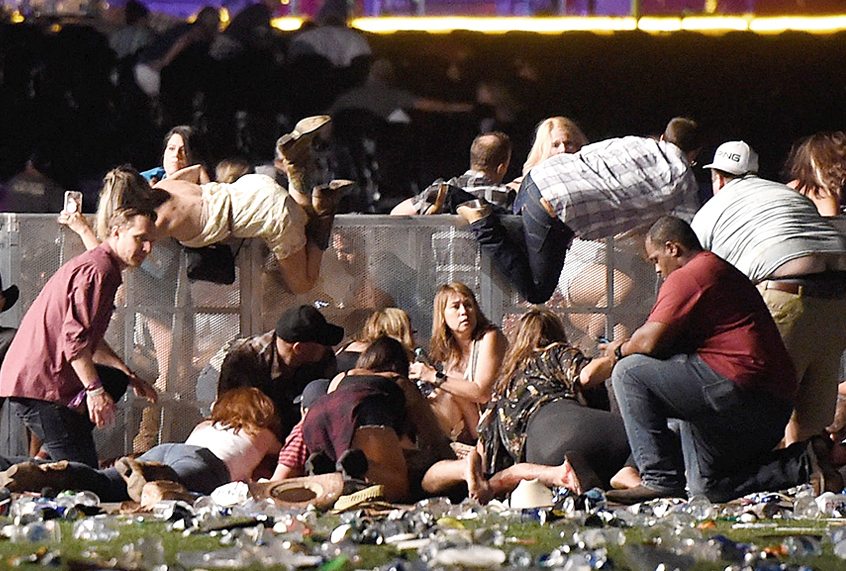Stephen Paddock amassed an arsenal of 47 guns and thousands of rounds of ammunition.
In 10 suitcases he lugged 23 of these guns into a hotel room at the Mandalay Bay Resort.
Stephen Paddock then mounted several of his assault rifles, which had been modified to fire in fully-automatic mode, onto tripods for greater stability and accuracy.
Late last Sunday night, Stephen Paddock then broke the window of his 32nd-floor hotel room and began shooting down into a crowd of 22,000 people who had gathered for a country music concert.
He killed 58 people and wounded roughly 500. With some notable exceptions, almost all of Paddock’s victims were white.
Paddock’s murder spree is but one more example of the fact that white men and boys commit a disproportionate number of mass shootings in America.
Stephen Paddock’s barbarism is also one more reminder of how white racism also hurts white people. Again, the color line cuts through all areas of American life. This includes America’s gun culture.
From before the founding of the United States, guns have been closely and inexorably linked to citizenship and power. To that end, guns were used by white settlers and others to commit genocide against First Nations peoples. Guns were also a way that the boundaries of white citizenship and authority over black people were created and maintained for centuries in America through terror and violence.
The Second Amendment to the U.S. Constitution was put in place largely to help ensure that Southern states would have access to guns and a militia to suppress slave rebellions. In the present, the relationship between whiteness and gun ownership continues in America. White men are 31 percent of the population but own 62 percent of the country’s guns. This power is also very concentrated. Recent research from Harvard University reveals that 3 percent of gun owners — most of whom are white men — own 50 percent of the guns in America.
The National Rifle Association is the largest and most powerful lobby for the gun manufacturing industry. Because profits are more important than people’s lives, the NRA’s primary goal is to increase gun sales. As part of that goal, the group works to stop any effort, however reasonable, to enact effective gun control laws. To accomplish those ends, the NRA uses racism and nativism (and fear-mongering more generally) to scare white Americans into supporting their agenda.
White racial resentment is highly correlated with gun ownership among white Americans. White people who also hold higher amounts of racial animus and hostility to black people are also more likely to oppose gun control and to support laws such as “stand your ground,” which are used disproportionately against nonwhites.
Toxic white masculinity is a major factor in understanding why white men commit a disproportionate percentage of mass shootings in America. This is a dysfunctional gender identity based on a sense of white racial grievance and male entitlement. Toxic white masculinity is also remarkably fragile. As such, violence on a large scale is a response to a perception that white men’s power as a group is somehow being threatened.
Gun violence intersects with some of the greatest social problems facing American society today. These civic evils include racism, sexism, classism, income inequality and the corrupting influence of big money in American politics. As such, there will be no meaningful efforts to stop gun violence in America. Why? Because to enact effective gun control laws would require confronting systematic injustice in American society — and this is a choice that relatively few of the country’s citizens are willing to make.

